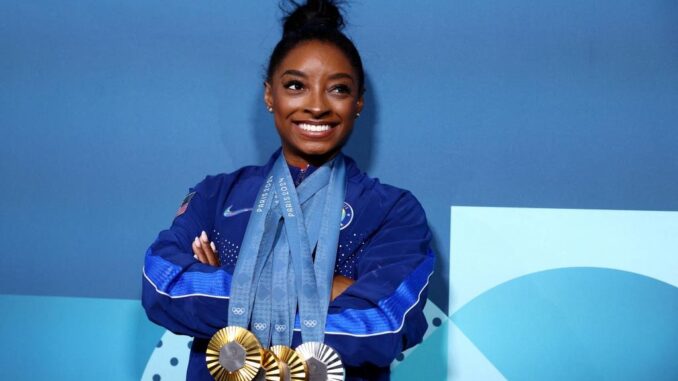
Conservative sports activist Riley Gaines used Olympian Simone Biles’ own words against her Sunday as their feud over transgender athletes reached a fevered pitch. Gaines — a former University of Kentucky swimmer vehemently opposed to trans participation in women’s sports — unearthed a nearly decade-old tweet that the gymnastics icon posted in which she appeared to agree with Gaines’ stance. “ahhhh good thing guys don’t compete against girls or he’d take all the gold medals !!” Biles wrote in the 2017 tweet, apparently responding to the men’s division results at the World Artistic Gymnastics Championships in Canada.
Gaines — who Biles referred to as a “sick bully” for her anti-trans stance Friday — let the Olympian have it. “Oop don’t you hate it when your past self completely undermines your current nonsensical argument?” she wrote while retweeting Biles’ post. “How has 2025 Simone reconciled with the fact 2017 Simone was a ‘truly sick bully’ by her own standard?” she added. The spat between the athletes started Friday when Biles aimed an unprompted tweet at Gaines, 25, amid furor over a Minnesota trans high-school softball pitcher whose shutout performance in the state finals Thursday helped win the championship.
“@Riley_Gaines_ You’re truly sick, all of this campaigning because you lost a race,” 28-year-old Biles tweeted, referencing Gaines’ tie during a race with trans University of Pennsylvania swimmer Lia Thomas at the 2022 NCAA championship. “Straight up sore loser. You should be uplifting the trans community and perhaps finding a way to make sports inclusive OR creating a new avenue where trans feel safe in sports. Maybe a transgender category IN ALL sports!!” Biles wrote. “bully someone your own size, which would ironically be a male,” she later added. Gaines quickly called Biles’ comments “disappointing” and said it wasn’t her task to figure out how to include trans people in sports.
Have you seen this craziness unfolding yet? One of gymnastics’ greatest athletes, Simone Biles, once casually wrote, “good thing guys don’t compete against girls”, back in the day. It seemed harmless—just another cheeky comment. But now? It’s back in the spotlight, and Riley Gaines, a vocal critic on gender from the viewpoint of sports equity, is throwing fuel on the fire. Let’s unpack the drama, the stakes, and what it all means.
1. What Did Simone Actually Say?
You might think it was just a flippant remark—but it stuck. In that old post, Simone appeared to celebrate the separation between male and female competition. It sparked nods from many, but others saw it as—well, outdated.
Context Matters
Simone wasn’t making a bold sociopolitical statement. She probably meant, “Thanks, biology, that we have fair categories.” But things change. And now the internet isn’t so forgiving.
2. Who Is Riley Gaines?
If you’re not familiar, Riley Gaines is an athlete-turned-advocate who’s made her voice heard on issues of gender identity and sport fairness. She’s become a lightning rod in a raging cultural debate.
H3: A Voice That Sparks Debate
Riley argues for what she considers fair competition. That often puts her at odds with voices celebrating fluidity in gender rules. Inevitably, that puts her and Simone on a collision course—whether Simone even meant it or not.
3. The Resurfacing: Why Now?
Ever notice how something you said years ago can come back and bite you? That’s exactly what happened.
Timing Is Everything
A blog or social-media user dug up Simone’s post, plastered it across news and comment threads, and suddenly: viral.
Twitter and TikTok Are Wild
Memes, reactions, heated comments—social media turned it into a battleground overnight.
4. What’s the Real Issue Here?
At surface level: “Girls versus guys.” But it’s bigger.
Gender, Fairness, and the Gym
It raises tough questions: Should trans women compete in women’s sports? How do we preserve fairness while being inclusive?
Simone’s Legacy vs. Current Climate
Simone’s a legend, not an activist. But legacies morph. Her words—past, playful or not—now have power in a new cultural moment.
5. Social Media’s Role in Turning Words into Headlines
Ever notice how a single line can go from invisible to trending?
Viral Power
That post might’ve been seen by a few hundred friends—until someone took a screenshot. Then it hit tweets, memes, news articles.
Amplification and Outrage
Outrage grows when you can’t ask for context. Social media loves sound bites—and Simone’s fit that bill.
6. Comparing Arguments: Biles vs. Gaines
Let’s break down the major positions in this twisty feud.
Simone’s Position
-
Said something flippant.
-
Possibly meant well.
-
Now re-interpreted through today’s lens.
Riley Gaines’ Standpoint
-
Advocates for clear categories in sport.
-
Sees Simone’s post as validation of her stance.
-
Fuels the conversation.
7. Public Reactions: What Are Fans Saying?
Opinions are all over the map.
“Simone’s Just Saying What We All Think…”
Some fans defend her, saying it’s common sense, biology, fairness.
“But Was It Necessary?”
Others worry it’s exclusionary—intentionally or not.
“Welcome to 2025—We’re Not Laughing, Simone.”
A segment of social justice advocates sees this as a slip toward outdated thinking.
8. Could Simone Respond—or Should She?
If you were Simone’s PR manager, what would you say?
Staying Silent
Might let it die. At this scale, anything she says could be twisted.
Clarify or Contextualize
“Hey, it was a joke, not policy.” Risky, but clarifying intent could diffuse.
Double Down
Unlikely, since she’s not known for controversy. But every option has its consequences.
9. Broader Implications for Women’s Sports
This story isn’t just about two individuals—it reflects larger cultural shifts.
Are Sports Policies Keeping Up?
As social norms and identities evolve, so must regulations—carefully.
Role Models Speak—and Sometimes Slip
Athletes become symbols, even when they just scribbled a comment once upon a time.
10. SEO-Focused Thoughts: Keywords to Watch
If your blog covers this topic:
Keywords like “Simone Biles old post,” “Riley Gaines feud,” “guys don’t compete against girls,” and “gender fairness in sports” are gold. They’re trending, searchable, and loaded with curiosity.
11. How to Talk About It Without Fueling the Fire
Curious about how to chime in without fanning the flames? Here’s a tip:
Ask, Don’t Accuse
Frame your content: “Why did this slip back into the headlines?” instead of “How wrong is Simone?”
Offer Perspective
Stick to facts—date of the post, what Simone’s career means, what Gaines stands for.
12. Could This Lead to Change?
You might wonder: is this moment just another meme or a wake-up call?
Could Athletic Policy Shift?
Maybe. Even older, seemingly harmless comments can spotlight policy gaps and renew debate.
A Wider Dialogue
Simone and Riley—separate perspectives—could spark balance between inclusivity and fairness.

13. Analogies to Tie It All Together
Think of it this way:
-
Like a pebble dropped years ago—that comment sat quietly… until social media is the equivalent of a wave that splashes it into the public eye.
-
Simone’s words were a single spark; cultural friction (Riley’s stance, policy debate) turned it into a spotlight.
14. The Real Winner—or Loser?
It’s not necessarily about who wins.
Dialogue Over Drama
Maybe the real upside is conversation. If we argue publicly but listen privately, that could be progress.
Beware of Headlines, But Value the Talk
Yes, it’s sensational. But it’s also forcing a question we all have to ask: how do we balance fairness and humanity in sport?
15. Wrapping It All Up
Simone Biles’ throwaway “good thing guys don’t compete against girls” post is back in focus thanks to Riley Gaines and a social media firestorm. What seemed like a casual comment now reflects heated debates on gender, fairness, and athletics. As the dust settles, what matters isn’t the drama—it’s the broader conversation that emerges. After all, the best stories aren’t just about conflict; they’re about the lessons we learn.
Conclusion
What started as a playful quip from a gymnastics legend has become a flashpoint in the debate over gender and sports fairness. Simone Biles probably didn’t foresee this moment—or the explosion of attention. But here we are, questioning how sports should evolve, how we should respond to past words, and how public figures navigate today’s fast-changing culture. Maybe this resurfaced post isn’t the end of the story—maybe it’s the start of something more meaningful.